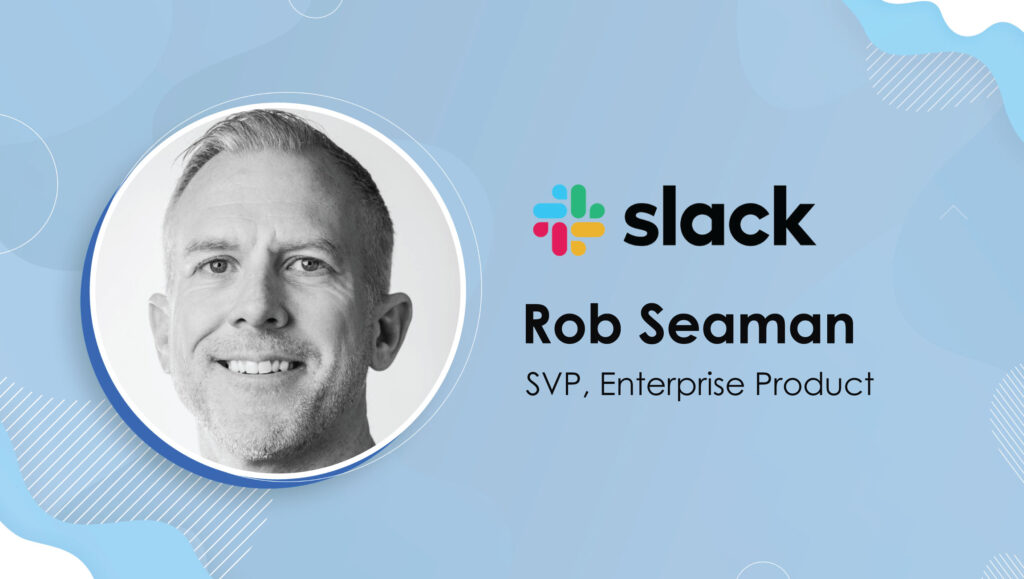Rob Seaman, SVP, Enterprise Product at Slack talks about Slack’s latest Sales Elevate feature and how it can benefit sales teams:
_________
Welcome to this SalesTechStar chat, Rob, tell us about your sales journey through the years and more about your role at Slack…
I started my career at Oracle and SAP leading product strategy and management, with a focus on call center, order management and CRM software. I later joined the Salesforce team, where I focused on solutions for the financial services and healthcare sectors. I then moved into a role that focused on leading the platform integration efforts between Salesforce and Slack prior to the acquisition, before shifting fully to Slack, where I now oversee product for enterprise. As part of my role, we’re bringing the power of the Slack platform front and center to help teams drive productivity and simplify work. It’s a really exciting time at Slack and as we work to bring technology, automation and people together to transform work at scale.
We’d love to hear more about Slack Sales Elevate and how it’s set to change the game for sales teams?
We’re really excited about the work Slack and Salesforce are doing to help sales teams supercharge productivity with automation to close deals quickly and drive even more growth for their organizations. Last December, we previewed this new, native solution that deeply integrates with Sales Cloud – Salesforce’s product suite for Sales leaders – and Slack to help teams lower costs, increase productivity and efficiency, and strengthen customer relationships.
Now, with the general availability of Slack Sales Elevate, we’re unveiling even more functionality and a robust product roadmap for sales teams. It’s a new native product in Slack that introduces an entirely new way to sell right in Slack. New functionality includes a new sales home, a single space within Slack, that can be fully customized and personalized to individual needs; account updates that provide automatic notifications on things like deals won, new opportunities or pipeline updates; no-code workflows with Salesforce-triggered notifications that automate things like support requests and deal approvals, without the need for technical expertise; and pre-built templates to help sales teams drive efficient, effective processes at scale.
Slack Sales Elevate is helping sales teams get the focused experience they need that’s grounded in the things that matter most to them. Companies like Roku are already using it to make business insights more accessible so they can sell more, faster. It’s built on Slack’s next-gen platform and powered by Sales Cloud data to help individuals and teams transform how they work by centralizing all the information they need and automating tasks typically done using multiple tools and platforms into one place: Slack.
Read More: SalesTechStar Interview with Paresh Vankar, CMO at LTIMindtree
What are some of the most in-demand sales features within today’s salestech systems that you feel are gaining more prominence in the market? What thoughts do you have surrounding the future of salestech based on this?
I think we’re seeing similar trends in sales as we are in other parts of businesses today. There’s a drive to promote efficiency and productivity while keeping costs low. Sales teams, in turn, are under more pressure than ever before to deliver results. Salesforce’s State of Sales Report found reps are contending with obstacles like too little time to actually sell and too many tools that result in inefficiencies in their day-to-day. Respondents say they spend 71% of their time on non-selling tasks and 66% said they’re overwhelmed by too many sales tools. Not to mention the headache of trying to collaborate across siloed teams.
The challenges sales teams are facing aren’t actually new. They’re the same ones they’ve been facing for some time but the macroeconomic environment we find ourselves in is bringing long-standing issues to light. Teams everywhere are under pressure to produce results, boost efficiency and lower costs. Tools that use automation to reduce the repetitive, mundane admin work off their plates are gaining prominence. For example, if you think about the entire sales process and how much communication and customer interaction goes into a single deal, that’s a lot of information that reps must contend with. If we can apply automation to bring all of those siloed insights together into one channel, reps will have access to the data they need at their fingertips, changing the game for how they collaborate and drive growth for their companies.
We’d love to hear your thoughts about the emerging use of generative AI and how you’ve been seeing brands use it to drive prospecting and sales engagement?
We’re seeing applications for generative AI in business explode. For sales, generative AI is acting as a coworker that handles the busywork for reps so they can sell more efficiently. It’s giving them more time to spend on what the work that energizes them most: building and maintaining relationships with customers. Generative AI is already being applied to do things like generate prospect emails, analyze data and streamline sales process tasks so sales reps can spend less time tracking down information across multiple tools or platforms so they can speed customer interactions, enhance personalization and deliver great experiences.
With Slack Sales Elevate, sales teams will soon be able to benefit from features like AI-powered no-code workflows to customize their sales processes, drive better engagement and close deals faster. Generative AI holds so much promise to help centralize data and insights, simplify the discovery and prospecting process and automate every process so sales teams can transform how they work and interact with potential customers.
In what ways can B2B sales and marketing teams use generative AI to further their personalization efforts?
Today’s sales reps spend far too much time trying to find data, crunching numbers and drafting emails, which takes away the time they can spend bringing the personalized approach they need to enhance relationship building with prospects and close more deals.
Generative AI is being applied to speed up and personalize the outreach process. For example, with generative AI, reps can use text-based prompts to research targets and create hyper-personalized prospecting emails, dramatically reducing the time needed to research and craft messages.
At Slack, we’re infusing AI and automation into sales templates to help summarize and populate information from meetings with prospects and customers, so reps can continue to build and maintain better relationships that lead to high quality interactions and more deals closed.
Read More: Internal and External Challenges Salespeople Face: Changing Approaches and Solutions

Slack is on a mission to make people’s working lives simpler, more pleasant and more productive. It is the productivity platform for customer companies that improves performance by empowering everyone with no-code automation, making search and knowledge sharing seamless, and keeping teams connected and engaged as they move work forward together. As part of Salesforce, Slack is deeply integrated into the Salesforce Customer 360, supercharging productivity across sales, service and marketing teams.
Rob Seaman joined Slack in 2022 to spearhead the company’s enterprise product vision and strategy. In his previous role, he was Salesforce’s SVP of Product Management for Slack to lead the platform integration efforts prior to the acquisition. Rob has led Product at three early stage startups in the Machine Learning Ops and personalization spaces and started his career at Siebel and SAP.
Missed The Latest Episode of The SalesStar Podcast? Have a quick listen here!
Episode 180: Visual Storytelling Best Practices with Andrew Fingerman, CEO of PhotoShelter
Episode 179: The Impact of Al in Sales and Marketing with Ketan Karkhanis, EVP & GM, Sales Cloud, Salesforce
Episode 178: RevOps and Revenue Generation Best Practices with Derrick Herbst, Director-Business Transformation at Conga





















